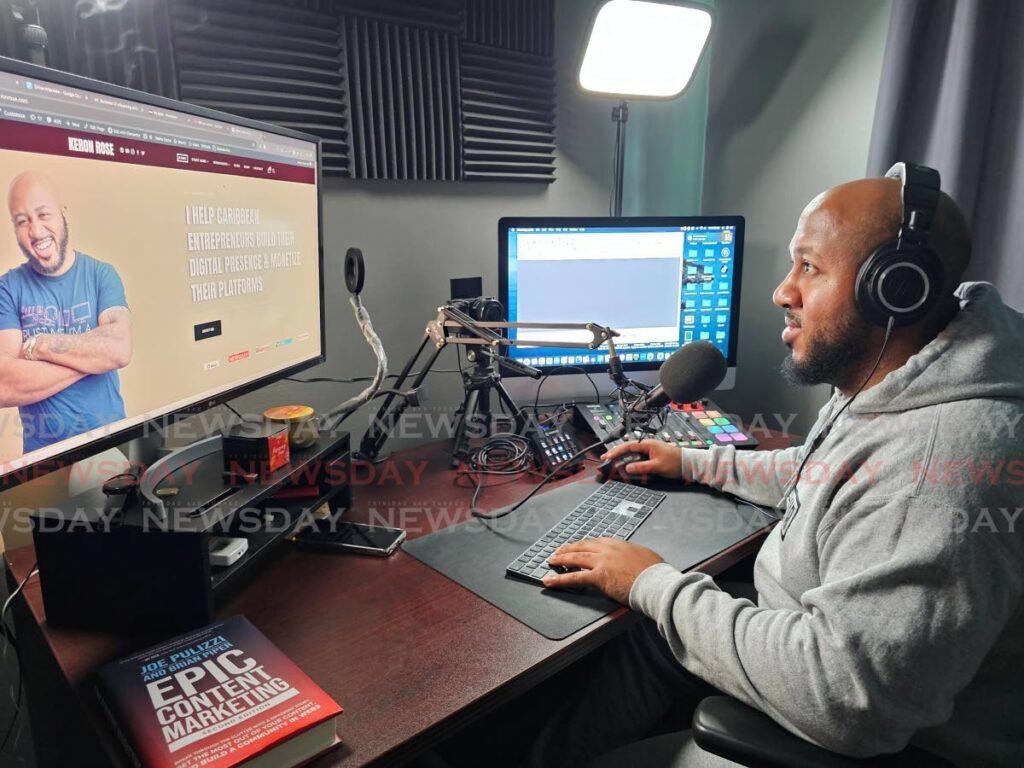Youth entrepreneur: Forex shortage tantamount to being financially trapped

YOUTH entrepreneur Keron Rose has described the situation with respect to foreign exchange (forex) distribution as being similar to being financially trapped.
Rose, who is an information communication technology (IT) specialist and columnist with Newsday's Business Day magazine, made this comment on November 1, in relation to matters concerning forex distribution in TT.
He said, "I honestly don't have much to say other than we are financially trapped in Trinidad and Tobago."
Over the last year, Rose said, he has been learning all of the different ways to generate his own US dollars, keep it and not bring any of it into the domestic financial system.
He said once this happens, he no longer has access to the forex, even when it is sitting in his own local US dollar account.
Rose added that he wrote an article about how he generates and keeps his forex.
Posted on his website, the article is titled "How I navigate the forex crisis in TT."
In the article, Rose said, "In TT, accessing foreign currency has become increasingly challenging due to the ongoing forex crisis and strict credit card limitations."
He added, "As local banks continue to restrict US dollar transactions, many people struggle to meet personal and business needs outside of TT, whether for online shopping, travel, or essential overseas payments."
Rose said ways of getting around these obstacles, includes "using the right combination of accounts, strategic transfers, and tools like WISE and PayPal."
These methods, he continued, have allowed him to manage the forex challenges he faces in TT.
Rose was hopeful they could help other people to find "practical ways to access and manage foreign currency more efficiently."
Issues regarding forex distribution have become prominent after Finance Minister Colm Imbert announced there would be a review of a special forex window that was established at the EximBank during the covid19 pandemic to allow importers of food, medicine and other essential supplies to have access to forex.
In a post on X, on October 27, Imbert announced a review of a special window at the EximBank created to give businesses access to forex for essential imports during the pandemic.
Using the X social media outlet, he also slammed a newspaper (not Newsday) for reporting that a local businessman had appealed to the IMF for help regarding the forex shortage, saying that his inquiries revealed this businessman had never even approached the EximBank for forex.
In a statement issued by his ministry on October 29, Imbert said, "Forex from the EximBank has never been sent directly to any importer." He added that all foreign payments, once verified, are made directly by the bank to vetted and validated international suppliers.
"Forex from the EximBank has only ever been allocated for importing essential goods, such as basic food and medicine during the covid19 period (pandemic), and principally, for inputs into manufacturing, such as raw materials and equipment."
It is a matter of record, the minister continued, that wholesale importers are aware that the forex window for essential imports was temporary.
"They were also informed in August of 2025, well before Budget 2025 was delivered (on September 30), that the forex facility was under review and would be amended to return the programme to its original intent and purpose."
Imbert said it is unfortunate that "some wholesale importers sought to make purchases without ensuring their source of funds, thus creating problems for themselves."
He added, "The direct provision of forex by government through the EximBank is designed to encourage export manufacturing and economic activity and is a policy intended to promote and support diversification, which no sensible person could object to."
In an e-mail sent to some customers on October 30, Scotiabank said it will reduce the US spending limit on its credit cards and restrict the usage of its Visa debit card for overseas transactions, effective December 1.
In a credit card notice posted to its website dated July 15, RBC said it planned to reduce the foreign-currency spending limit for its credit-card customers effective September 1.
The total monthly limit was reduced from the equivalent of $51,000 (US$7,500) to $41,000 (US$6,000) or the maximum of the account’s credit limit, whichever was less.
Last September, Republic Bank advised customers of changes to come into effect in that month
This involved the US-dollar limit on its credit cards being reduced from US$10,000 to $5,000 per cycle.

Comments
"Youth entrepreneur: Forex shortage tantamount to being financially trapped"